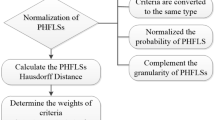Abstract
Fuzzy cognitive maps (FCMs) have been widely used in several domains for information processing, such as, data fusion, decision making. Although several methods to automatically learn FCMs are recognized from the scientific literature, the most used approach to build an FCM relies on a collaborative task involving single person or, more suitably, group of experts. Collaborative development increases reliability and robustness of the resulting FCM, but rises some problems in terms of group decision making to aggregate different perspectives of the problem representation. This paper proposes to support collaborative development of FCMs introducing knowledge engineering process that relies on Linguistic Fuzzy Consensus Model. In the proposed approach, each expert builds the own version of the FCM. When all different versions are available, a Group Decision Making process is activated in order to reach the consensus on conflictual modeling opinions. The result is a unique final version of the FCM that is not a simple aggregation of the versions provided by the experts but is the result of a well-suited mathematical model. In addition, this work adopts consensus model with incomplete preference relations scheme to address knowledge harmonization issues. Finally, advantages and the limitations of the proposed framework are argued.




Similar content being viewed by others
Notes
JFCM is a Java library for FCMs. http://jfcm.megadix.it/.
Mental Modeler is modeling software for FCMs. http://www.mentalmodeler.org/.
References
Alonso, S., Cabrerizo, F. J., Chiclana, F., Herrera, F., & Herrera-Viedma, E. (2009). Group decision making with incomplete fuzzy linguistic preference relations. International Journal of Intelligent Systems, 24(2), 201–222.
Beena, P., & Ganguli, R. (2011). Structural damage detection using fuzzy cognitive maps and hebbian learning. Applied Soft Computing, 11(1), 1014–1020.
Bryson, N., Mobolurin, A., & Joseph, A. (1997). Generating consensus fuzzy cognitive maps. In Proceedings of intelligent information systems, 1997 (IIS’97) (pp. 231–235). IEEE.
Cabrerizo, F. J., Chiclana, F., Al-Hmouz, R., Morfeq, A., Balamash, A. S., & Herrera-Viedma, E. (2015a). Fuzzy decision making and consensus: Challenges. Journal of Intelligent & Fuzzy Systems, 29(3), 1109–1118.
Cabrerizo, F. J., Morente-Molinera, J. A., Pérez, I. J., López-Gijón, J., & Herrera-Viedma, E. (2015b). A decision support system to develop a quality management in academic digital libraries. Information Sciences, 323, 48–58.
Cabrerizo, F. J., Urea, R., Pedrycz, W., & Herrera-Viedma, E. (2014). Building consensus in group decision making with an allocation of information granularity. Fuzzy Sets and Systems, 255, 115–127. doi:10.1016/j.fss.2014.03.016.
De Maio, C., Fenza, G., Gaeta, M., Loia, V., & Orciuoli, F. (2011). A knowledge-based framework for emergency dss. Knowledge-Based Systems, 24(8), 1372–1379.
Gray, S., Chan, A., Clark, D., & Jordan, R. (2012). Modeling the integration of stakeholder knowledge in social-ecological decision-making: Benefits and limitations to knowledge diversity. Ecological Modelling, 229, 88–96.
Herrera, F., Alonso, S., Chiclana, F., & Herrera-Viedma, E. (2009a). Computing with words in decision making: Foundations, trends and prospects. Fuzzy Optimization and Decision Making, 8(4), 337–364.
Herrera, F., Herrera-Viedma, E., Alonso, S., & Chiclana, F. (2009b). Computing with words and decision making. Fuzzy Optimization and Decision Making, 8(4), 323–324.
Herrera, F., Herrera-Viedma, E., et al. (1996). A model of consensus in group decision making under linguistic assessments. Fuzzy Sets and Systems, 78(1), 73–87.
Herrera, F., & Martínez, L. (2000). A 2-tuple fuzzy linguistic representation model for computing with words. IEEE Transactions on Fuzzy Systems, 8(6), 746–752.
Herrera-Viedma, E., Herrera, F., & Chiclana, F. (2002). A consensus model for multiperson decision making with different preference structures. IEEE Transactions on Systems, Man and Cybernetics, Part A: Systems and Humans, 32(3), 394–402.
Kosko, B. (1992). Neural networks and fuzzy systems: A dynamical systems approach to machine intelligence/book and disk (Vol. 1). Upper Saddle River: Prentice hall.
Kumar, R., & Vassilvitskii, S. (2010). Generalized distances between rankings. In Proceedings of the 19th international conference on World wide web (pp. 571–580). ACM.
Morente-Molinera, J., Wikström, R., Herrera-Viedma, E., & Carlsson, C. (2016). An implementation of a linguistic mobile decision support system based on fuzzy ontologies to facilitate knowledge mobilization. Decision Support Systems, 81, 66–75.
Obiedat, M., & Samarasinghe, S. (2013). Fuzzy representation and aggregation of fuzzy cognitive maps. In The 20th International Congress on Modelling and Simulation (pp. 684–690). Modelling and Simulation Society of Australia and New Zealand.
Pérez, I. J., Cabrerizo, F. J., Alonso, S., & Herrera-Viedma, E. (2014). A new consensus model for group decision making problems with non-homogeneous experts. IEEE Transactions on Systems, Man, and Cybernetics: Systems, 44(4), 494–498.
Pérez, I. J., Cabrerizo, F. J., & Herrera-Viedma, E. (2010). A mobile decision support system for dynamic group decision-making problems. IEEE Transactions on Systems, Man and Cybernetics, Part A: Systems and Humans, 40(6), 1244–1256.
Salmeron, J. L., Vidal, R., & Mena, A. (2012). Ranking fuzzy cognitive map based scenarios with topsis. Expert Systems with Applications, 39(3), 2443–2450.
Stach, W., Kurgan, L. A., & Pedrycz, W. (2005). Survey of fuzzy cognitive map learning methods. In P. Grzegorzewski, M. Krawczak, & S. Zadrozny (Eds.), Issues in Soft Computing: Theory and Applications (pp. 71–84). Berlin: Springer.
Suárez-Figueroa, M. C., Gómez-Pérez, A., & Fernández-López, M. (2012). The NeOn methodology for ontology engineering. In M. C. Suárez-Figueroa, A. Gómez-Pérez, E. Motta, & A. Gangemi (Eds.), Ontology engineering in a networked world (pp. 9–34). Berlin: Springer. doi:10.1007/978-3-642-24794-1_2.
Subramanian, J., Karmegam, A., Papageorgiou, E., Papandrianos, N., & Vasukie, A. (2015). An integrated breast cancer risk assessment and management model based on fuzzy cognitive maps. Computer Methods and Programs in Biomedicine, 118(3), 280–297.
Yager, R. R., & Alajlan, N. (2014). On characterizing features of owa aggregation operators. Fuzzy Optimization and Decision Making, 13(1), 1–32.
Yuen, K. K. F. (2014). Combining compound linguistic ordinal scale and cognitive pairwise comparison in the rectified fuzzy topsis method for group decision making. Fuzzy Optimization and Decision Making, 13(1), 105–130.
Author information
Authors and Affiliations
Corresponding author
Rights and permissions
About this article
Cite this article
De Maio, C., Fenza, G., Loia, V. et al. Linguistic fuzzy consensus model for collaborative development of fuzzy cognitive maps: a case study in software development risks. Fuzzy Optim Decis Making 16, 463–479 (2017). https://doi.org/10.1007/s10700-016-9259-3
Published:
Issue Date:
DOI: https://doi.org/10.1007/s10700-016-9259-3




